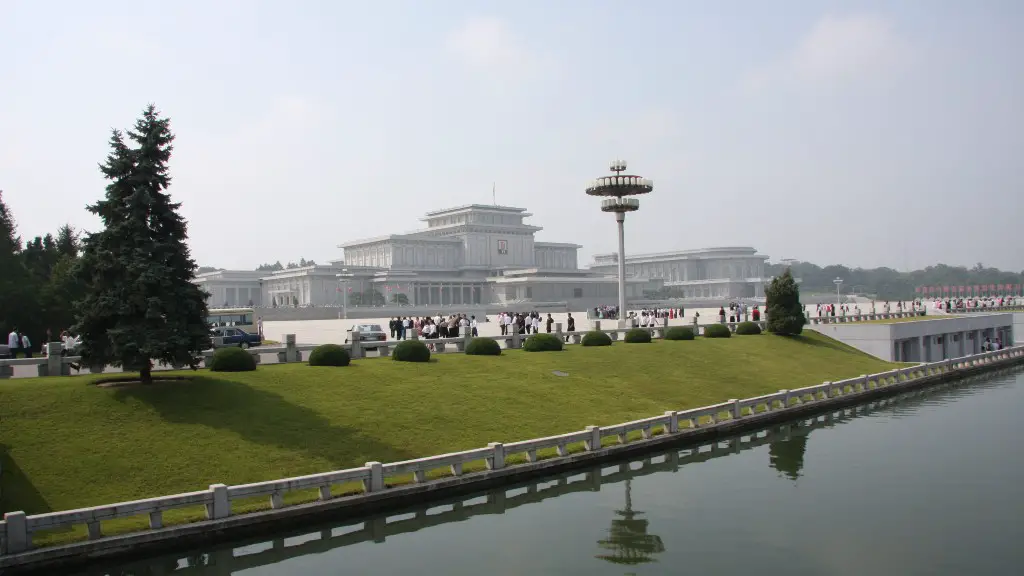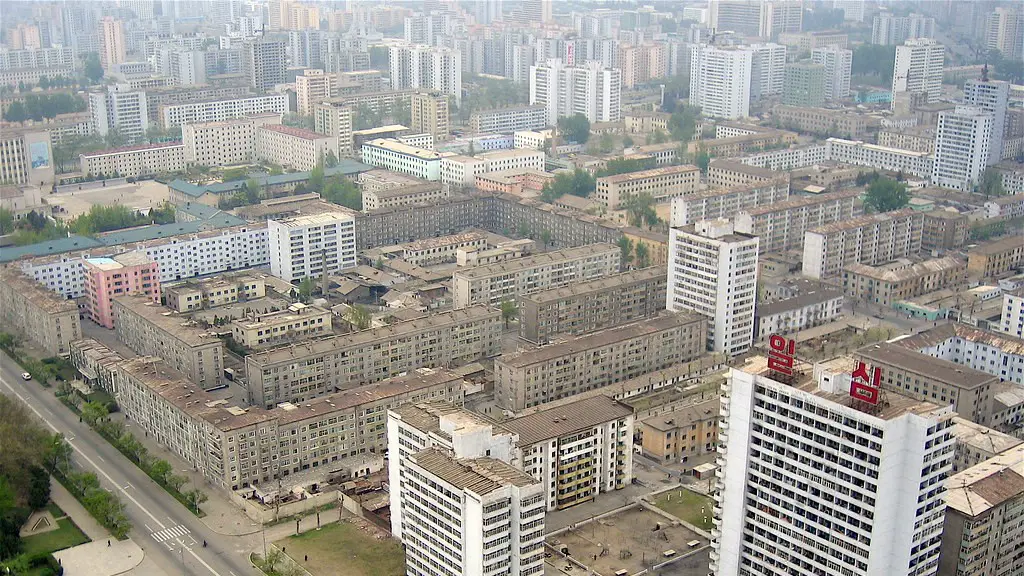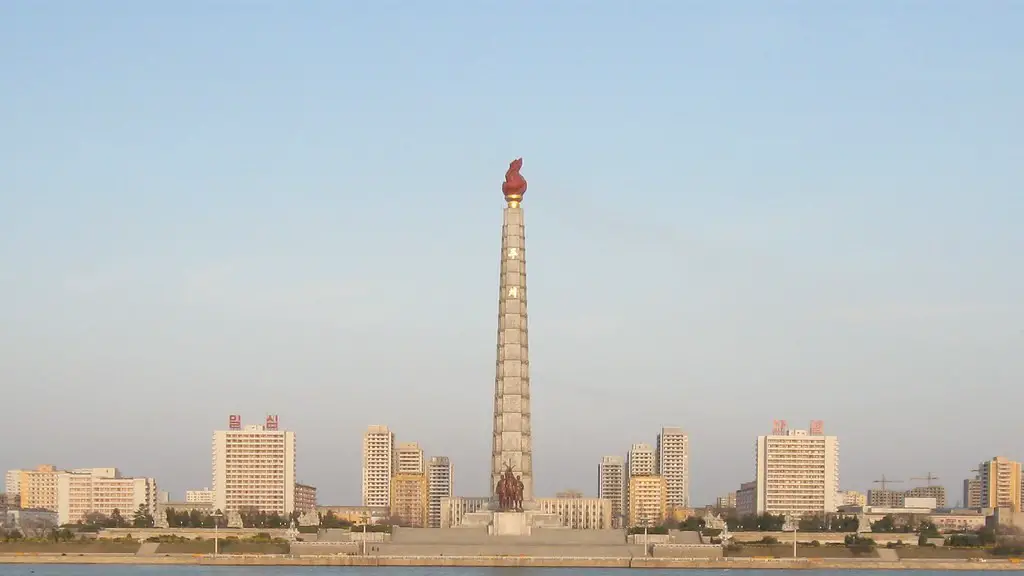Living Conditions
Living in North Korea is a difficult reality for most of its citizens. With a population of more than 25 million, the country faces many challenging economic, political and social problems. As a result, the quality of life in this secretive nation remains poor, with widespread poverty and a lack of access to basic services like running water, electricity and healthcare.
The government is said to use food as a tool for control, sending those deemed loyal to the regime priority access to food and resources, while those who speak out against the regime often suffer from food insecurity and malnutrition. Furthermore, citizens must abide by strict rules of behavior, or else they risk facing severe punishment.
In terms of housing, the majority of North Koreans inhabit rural areas, living in overcrowded, single-story brick huts and small farmhouses. Those who live in urban cities can typically be found in drab high-rise apartments. The living quarters may share communal kitchens and bathrooms, with a single room usually housing an entire family.
Education and Employment
North Koreans enjoy a low unemployment rate, as the government has striven to keep the population employed. Education is held in high regard in North Korea, as it is seen as a way to honor the Kim Jong-Un regime. All citizens are required to have at least a high school education, and university education is becoming increasingly popular, with the government-funded scholarship system giving students access to a free education.
Most of the jobs available in North Korea revolve around the manufacturing and agricultural industries, and the majority of workers are employed by the government. However, there is an increasing number of private businesses and cooperatives popping up, though these are generally small to medium scale enterprises.
Forbidden Activities
Not only is it risky to speak out against the government, but North Koreans are also required to obey many other laws, such as laws regulating what they can wear, watch, read or listen to. The media is strictly controlled and censored, and news and information from the outside world is heavily restricted. The use of smartphones is also forbidden, and private ownership of any type of communication device can lead to severe punishment.
Citizens are not allowed to travel or communicate with people outside of their country without explicit permission. Moreover, leaving the country is strictly prohibited and those caught attempting to flee face arrest or even execution.
Religion and Censorship
The state religion, Juche, is mandatory for all citizens and must be practiced in order to be considered a loyal subject. The article 38 of the Constitution grants the citizens the freedom to practice other religions, however, due to its nature as a secretive state, more information about other religious practices has yet to be discovered.
Censorship plays a major role in North Korean society. A powerful propaganda machine is said to be operating, especially in the media, which only broadcasts heavily censored news and information. People are only allowed to read books or watch movies approved by the government, and access to the internet is severely restricted.
Freedom of Expression
Perhaps the most oppressive aspect of North Korea is the lack of freedom of expression. North Koreans lack the right to express their thoughts and opinions, and dissenters are quickly silenced by the government. This lack of an open public forum can be damaging, leaving citizens feeling like they are living in a vacuum.
Anyone who decides to criticize the government or its leaders is often met with severe punishment and can be arrested, sent to labor camps, imprisoned or even executed. Political prisoners who have served their time have often shared stories of torture, labor and deprivation.
Access to Resources and Technology
Most North Koreans have limited access to basic utilities, such as running water and electricity. While the government has made some strides in recent years in providing access to these resources, some areas remain poorly supplied. This means that many people in rural areas are still dependant on natural sources of water and energy, such as wind, solar or wood burning.
The lack of access to technology and the internet means that most North Koreans are isolated from the outside world. Due to the country’s strict censorship rules, the only information citizens have access to is heavily filtered news from the government. As a result, few people have the knowledge or resources to form an opinion about the world beyond their borders.
The Impact of International Sanctions
The economic sanctions imposed on North Korea by the international community have had a drastic impact on the lives of ordinary citizens. With access to the global economy cut off, the country’s already tarnished economy has been further crippled and citizens are struggling to make ends meet. Global prices for oil, food, medicines and other basic needs have increased, making it increasingly difficult for citizens to meet their basic needs.
Furthermore, the country has had to rely on its own resources, with limited access to money and foreign technology. This has enabled the government to strengthen its control operations, further isolating the population and leaving citizens with few options.
Daily Life in North Korea
Life in North Korea is often depicted as oppressive and difficult, but the experience of living within its borders is highly varied. There is a vibrant informal economy that has grown in recent years and is often shielded from government view. Despite the poverty, many families are able to make a living, teaching in universities or working in markets.
Additionally, the country’s cultural heritage is still alive, with traditional festivals and ceremonies still being held. Arts and music, although heavily censored, are still popular amongst citizens young and old.
Citizen Rights
On a legal level, North Korean citizens are largely deprived of their rights. The state exercises strict control over the ability for citizens to move, communicate, access media and form opinions. While citizens are theoretically allowed to vote, elections and referendums are highly organized and tightly controlled.
In 2009, the North Korean government did pass a law against torture and ill-treatment in prison, but reports suggest that this law is often ignored. Amnesty International believes that the government persists in using violence and inducing fear to keep its power over the population, while other non-governmental organizations have argued that the country needs increased pressure to end its human rights violations.
Social Stratification
North Korea is divided into two distinct classes, separated into the core, or loyal class, which are those most loyal to the Kim Jong-Un regime and his government, and the marginal class, which are those deemed less loyal. Core class members have greater access to key resources, such as food and energy, as well as privileges like social outings and educational opportunities. Meanwhile, marginal class citizens often have decreased access to resources and services, and are often kept in check by oppressive policies.
The core and marginal classes in North Korea have become even more clearly defined as the country has become more isolated from the world. The core class has enjoyed great economic growth and access to resources, while the marginal class has suffered, lacking access to adequate resources and having little opportunity to challenge the system.
Cultural Expression and Arts
Despite the oppressive nature of North Korea’s government, the people of North Korea have found ways to express their culture and creativity. Traditional folk art, music and dance still remain popular, and there is a growing appreciation for modern art and media.
The state’s support for the Arts has played a role in preserving traditional cultural practices, as has its continued censorship of film, television and other forms of media. North Koreans also continue to find covert ways to access information from the outside world, such as through smuggled USBs and secret radio broadcasts.
Outlook for the Future
Looking to the future, the prospects for citizens of North Korea remain unclear. Hope for change seems distant, as for now the country remains mired in secrecy, hardship and oppression. Nonetheless, the citizens themselves have shown tremendous resilience, and continue to strive for a better future for themselves and their country.



